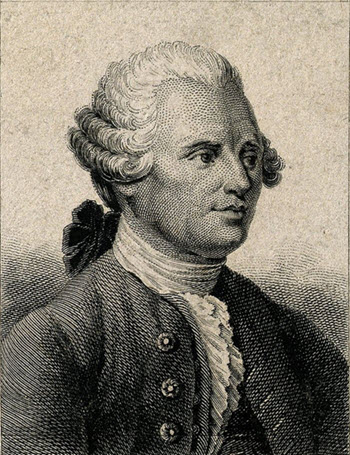 Jean le Rond d'Alembert (Born November 16, 1717 - Died October 28, 1783 at age 65) was a French mathematician, philosopher, encyclopedist, and leading figure in the European Enlightenment. He co-edited the Encyclopedia with Diderot, and is also renowned for developing several important mathematical theorems.
Jean le Rond d'Alembert (Born November 16, 1717 - Died October 28, 1783 at age 65) was a French mathematician, philosopher, encyclopedist, and leading figure in the European Enlightenment. He co-edited the Encyclopedia with Diderot, and is also renowned for developing several important mathematical theorems.
D'Alembert was product of a brief liaison between his mother Claudine Guérin de Tencin (1682-1749), a former nun who had fled the convent and established a fashionable salon in Paris, and most likely Duke Leopold Joseph Philippe Charles d'Arenberg (1690-1754). The day after his birth, D'Alembert's mother abandoned him and had one of her servants deposit the baby at the doorstep of the chapel of Saint-Jean-le-Rond, attached to the Notre-Dame Cathedral. He was taken in by the clerics and placed in a home for foundlings. As was the custom, he was given the name Jean la Rond after the patron saint of the chapel where he had been rescued.
Having learned of his son's birth, but not wishing to acknowledge his paternity, the Duke gave one of his trusted men the task of rescuing the boy from the orphanage and looking after his education. Jean was placed in the home of a family who raised him, receiving secret payments through the Duke's intermediary. Jean also received a good education at the Duke's expense, and showed great intellectual ability even at an early age.
At only 12 years old, Jean entered university under the pseudonym of Daremberg, after his father, and then adopted the name D'Alembert, which he would use throughout the rest of his life. D'Alembert soon earned his law degree, but then refused to practice, and then pursued medical studies for a few years but did not complete them. He was still only a teenager.
At the age of 21, he presented his first scientific paper to the French Academy of Science. His paper demonstrated errors in the published works of much senior and established mathematicians. In consequence of his astonishing prowess in the field of mathematics, D'Alembert was granted the high honor of being admitted as a member to the Royal Academy of Science at only 23 years of age. When he was only 28, he was elected to the exclusive Berlin Academy of Science and he was granted the highest honor by being made a member of the exclusive Academie Francaise.
D'Alembert would discover and prove many important mathematical formulas and theorems, which are important to mathematics even today. He was also a man of letters, mixing with Voltaire and other luminaries of French intellectual society in the salons of Paris. It was through these social connections that he met Diderot, and would come to be the co-editor and writer of the influential Encyclopedia.
In 1745, D'Alembert, who was a member of the Academy of Sciences, was charged by André Le Breton to translate from English into French, Ephraim Chambers' Cyclopaedia, one of the first encyclopedias published. From a simple translation, the project turned into writing an original and unique work, l’Encyclopédie ou Dictionnaire raisonné des sciences, des arts et des métiersthe {Encyclopedia or Logical Dictionary of Sciences, Arts and Crafts. D'Alembert wrote the famous preliminary discourse and most of the articles on mathematics, astronomy and physics. In all he wrote almost 1,700 articles, mostly on mathematics.
His contribution to the intellectual and scientific enlightenment which swept through Europe during his era is incalculable.